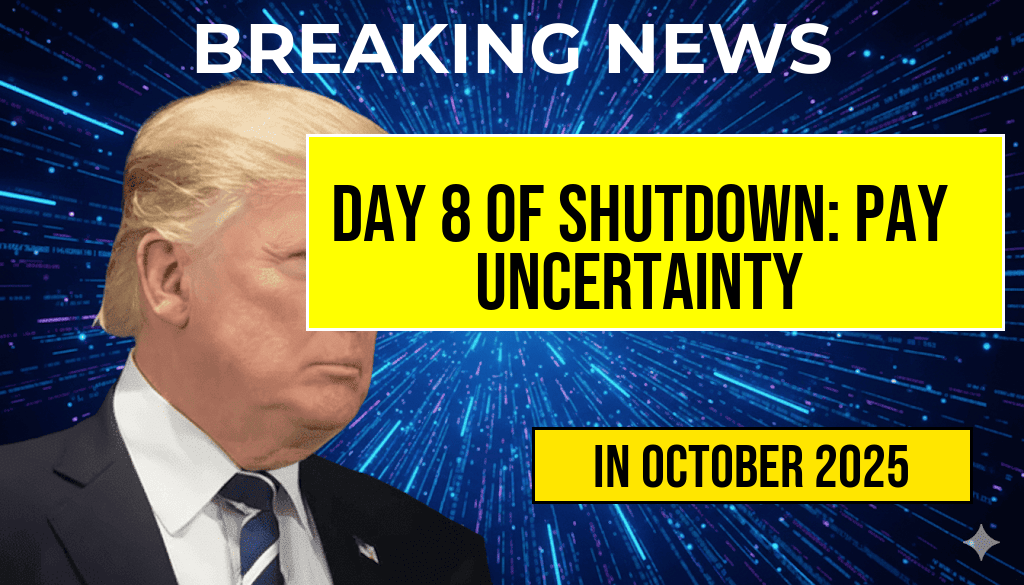As the federal government enters its eighth day of shutdown, uncertainty looms over the compensation of federal employees. With agencies closing their doors and services being disrupted, many workers are left wondering whether they will receive no pay or be fully compensated for their time away from work. The situation raises critical questions about the impact of the shutdown on federal employees, their families, and the broader economy. As negotiations between lawmakers continue, the fate of federal workers hangs in the balance, and the repercussions of this impasse could be felt long after the shutdown concludes.
Current Status of the Government Shutdown
The ongoing shutdown was triggered by a budget impasse in Congress, primarily over disagreements related to funding levels for key federal programs. As a result, numerous federal agencies have halted operations, affecting hundreds of thousands of employees nationwide. While some essential services remain operational, many federal workers are facing a grim financial outlook as the shutdown drags on.
Impact on Federal Workers
Federal employees are categorized as essential and non-essential. Essential workers continue to perform their duties without interruption, while non-essential employees are placed on indefinite leave without pay during the shutdown. The question of whether they will eventually receive back pay has become a focal point of discussion among lawmakers and employees alike.
Will Non-Essential Workers Receive Back Pay?
Historically, federal workers affected by a government shutdown have received back pay after the resolution of funding issues, although there are no guarantees. According to the Federal Employee Fairness Act, which was enacted in previous shutdowns, Congress has typically moved to ensure that federal employees receive compensation for time lost due to government closures.
As of now, discussions are underway in Congress about the potential for back pay legislation. This would not only address concerns for non-essential workers but also provide reassurance to essential employees who are currently working without pay. The likelihood of such measures depends on the outcome of ongoing negotiations and the willingness of lawmakers to act swiftly.
What Are the Financial Implications for Federal Employees?
The financial strain caused by a prolonged shutdown can have severe repercussions for federal employees. Many rely on their salaries to meet everyday expenses, including housing, food, and childcare. A lack of income can lead to increased financial stress, forcing some employees to seek alternative employment or rely on savings.
- Housing Instability: Many federal workers may struggle to meet mortgage or rent payments.
- Food Security: The inability to purchase groceries can lead families to face food insecurity.
- Childcare Costs: Parents may be forced to make difficult decisions regarding childcare during the shutdown.
Public Response and Support
As the shutdown continues, public support for federal workers has gained traction. Advocacy groups and unions are mobilizing efforts to raise awareness about the challenges faced by government employees during this difficult time. Several online campaigns aim to generate funds and provide resources for affected workers, highlighting the importance of supporting those who serve the public.
Looking Ahead: What’s Next?
With negotiations ongoing, federal employees and their families are anxiously awaiting a resolution that will not only restore funding but also ensure their financial security. The path forward remains uncertain, but the collective hope is that lawmakers will prioritize the needs of federal workers, recognizing their vital role in the functioning of government.
As discussions continue, it is essential for affected workers to stay informed and seek assistance where needed. Various resources are available to help navigate the challenges posed by the shutdown, including financial counseling and support services. The stakes are high, and the outcome will have lasting implications for the federal workforce and the economy as a whole.
For more information on the historical context of government shutdowns and their impact on federal employees, visit Wikipedia.
Frequently Asked Questions
Question 1: What is the current status of the federal government shutdown?
The federal government is currently in its eighth day of shutdown, which has led to uncertainties regarding the compensation of federal workers.
Question 2: Will federal workers receive any pay during the shutdown?
During the shutdown, many federal workers are facing the possibility of receiving no pay until the government reopens, although some may be eligible for back pay once the situation is resolved.
Question 3: What options do federal workers have if they are not compensated?
If federal workers do not receive pay, they may consider applying for unemployment benefits or seeking temporary work opportunities until the shutdown is lifted.
Question 4: How does the shutdown affect essential and non-essential workers?
Essential workers may continue to work without pay, while non-essential workers are typically furloughed and do not report to work during the shutdown.
Question 5: Is there any indication of when the shutdown might end?
As of now, there is no definitive timeline for when the government shutdown will end, but discussions among lawmakers are ongoing in hopes of reaching an agreement soon.











